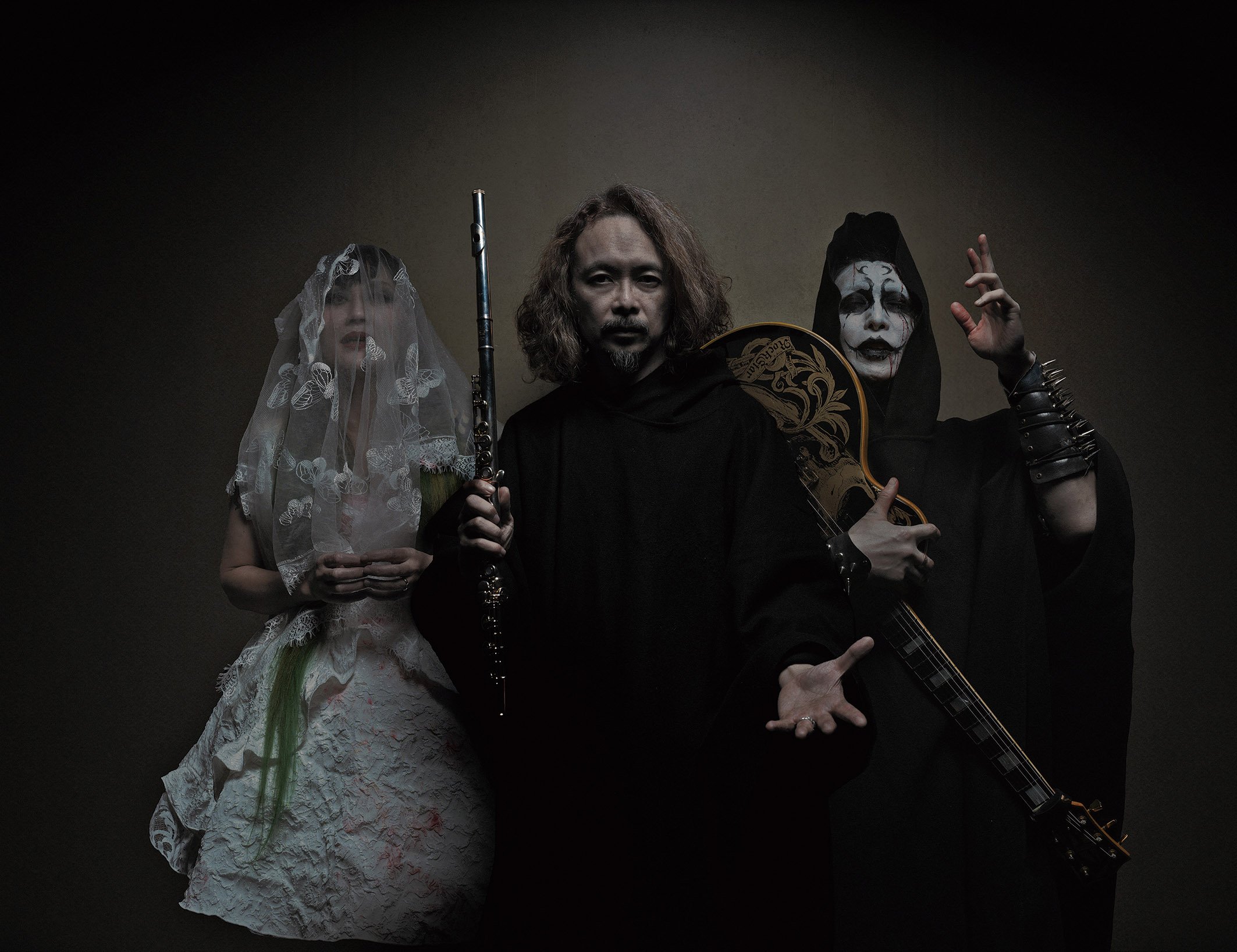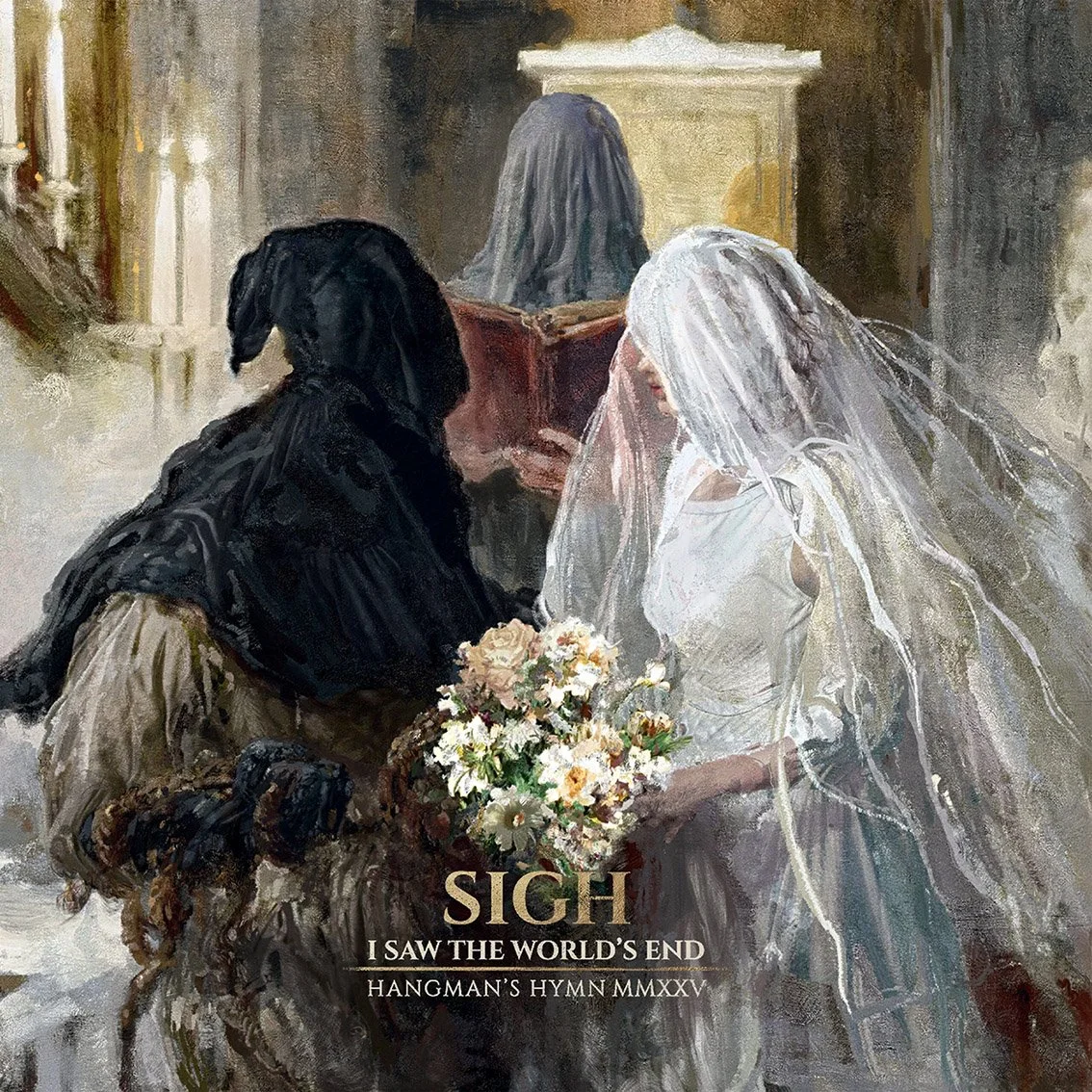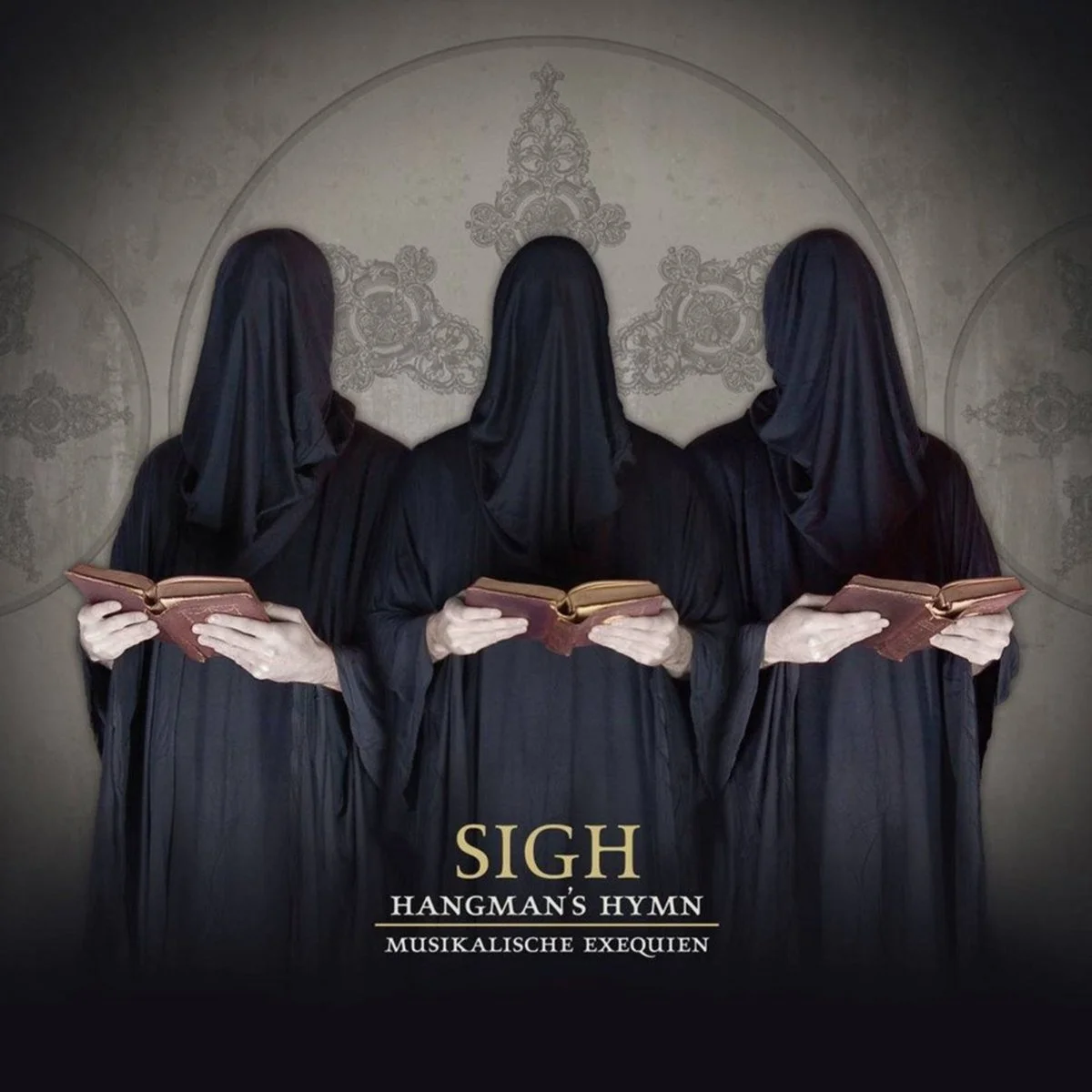
“I still haven’t fired him. I think he’s still in the band.”
SIGH
———————————
EXCLUSIVE INTERVIEW (2025)
———————————
35 years into their career, Japan’s pioneering extreme metal maniacs, Sigh, are experiencing a well-earned resurgence – something of a surprise, but definitely a welcome one. The excellent 2022 album, Shiki, which initially seemed to be the band’s swansong, actually marked the beginning of a renewed creative chapter. Fuelled by fresh inspiration, the band has been active on the tour circuit, with critically acclaimed appearances at major festivals such as Damnation, ArcTanGent, and Maryland Deathfest, expanding the group’s fanbase.
The latest addition to their extensive arsenal is the explosive I Saw the World’s End – Hangman’s Hymn MMXXV, a work that, as the title indicates, revisits the 2007 album Hangman’s Hymn - Musikalische Exequien. Featuring an entirely different cast of musicians – save of course for the founding member Mirai – the new opus is characterised by refined arrangements and markedly different performances, including that of drummer Mike Heller [Raven, Malignancy, Black Hole Deity] and the dynamic guitarist Nozomu Wakai, now a full-time member of the band. We made a crafty video call to Mirai for some insights on the record and the band’s plans for the future.
[I Saw the World’s End – Hangman’s Hymn MMXXV and a variety of Sigh merchandise is available at our main store - click HERE]
Cult Never Dies: Do you feel this newly released version of Hangman’s Hymn captures the songs as you originally envisioned them back in the mid-2000s? Do you feel this is the definitive edition of the album?
Mirai: “Yes! Usually, whenever I finish an album, I have complaints. But from Shiki onward, I don’t have any complaints. The album Shiki and the new Hangman turned out perfectly, just as I wanted them to be. Hangman is way more fierce and brutal than the original. I didn’t change any melodies – I just slightly changed some arrangements, the song structures are the same, and the melodies are the same – but still, it is quite different from the original. So you can listen to it as a different album from the original, it’s Hangman’s Hymn 2, I suppose.”
Reviews so far seem to be very favourable…
“Actually, the reactions have been much better than I expected. I was expecting much more backlash, especially from the fans who loved the original, because it sounds so different. The critics seem to like it too and I’m a bit baffled there, because some of the reviews are better than those for Shiki – it’s just a rerecording, so if it tops the reviews of the last original album... well, I don’t know [laughs].”
What were the main aspects of the original release that left you dissatisfied, and what motivated you to rerecord the entire album?
“There are many. The original Hangman’s Hymn... I think it was one of the best compositions I’ve made. But that didn’t mean it was my favourite album, because I didn’t like a lot of things, and probably the biggest issue was production. The problem was, even in 2007, nobody in Japan had the technique or knowledge to mix extreme metal, and especially with that sort of orchestration. The production was very poor. And another problem was the drumming, because it’s so monotonous. From the very beginning to the end of the album, he kept the same beat. So boring. And of course, the guitar playing was sloppy, and my orchestration technique was far from perfect. So I just wanted to re-record it with decent production and decent musicians.”
How did you set about doing that? Was this version recorded entirely in home studios?
“Yes – the drums were played by Mike Heller, and he has his own studio, so he recorded everything there, and I recorded everything else in my studio. And Nozomu recorded his guitars and bass in his home.”
Mike’s drumming on the songs is very different in approach to those of original drummer Junichi Harashima – was it an easy decision to continue working with him after he played on Shiki?
“Yes, Shiki worked really well, so there was no reason to change. It was a no-brainer. He can play anything, and he can record everything in his own studio, so I’m quite sure we will keep working together for the future releases too.”
Did he handle all of the drum arrangements as well, or were you involved in that?
“Actually, I left everything up to him. I just told him, ‘Please play as crazy as possible.’ Simply, I just wanted him to play as he liked. But honestly, I got the first version of [opening song] ‘Introitus’ from him, and I was not sure, because it sounded so different from the original, it’s got full-on blast beats and... it was not easy to tell if I should go with this direction for the first listen. I had to keep listening to it, maybe 20 or 30 times, to decide what to do. But just rerecording the album with better production could be boring, so finally I just decided to go with this totally crazy drumming.”
Did you approach any other parts of the performances differently?
“My vocals are much more expressive this time, because my vocals on the original one are very monotonous too. But this time I tried to have some variations, even just for the screaming parts. So I think it is very, very expressive compared to the original.”
Why did the original recording end up having several elements that you consider monotonous? Were you unhappy with them at the time?
“Well, as far as the drumming, it’s just a drummer’s problem, honestly. His drumming was always monotonous, even for the later albums. He doesn’t have many variations on his drumming, and of course, it was a studio budget thing, too – if you try some technical things, it can take some time, and we had a short amount of time to complete the recording for the [original album]. It was like a week, I guess, a week or ten days, and we had to be conservative to finish the recording within the budget.”
I’m curious if you’ve spoken about the rerecording to either of the other musicians who appeared on the original album, namely your longtime bandmates Satoshi [Fujinami] and Shinichi [Ishikawa]?
“No, because I simply don’t have any connection with them anymore.”
Oh, really? I thought you were still in contact with Satoshi at least.
“No, because uh... I still haven’t fired him. I think he’s still in the band. Three years ago, did I tell you? Probably I told you, but... three years ago, before we went on the European tour, we went into the studio with Nozomu and Satoshi, but he was very strange. He had some kind of hearing problem, probably because of stress or something, and he acted very strangely, and couldn’t play bass very well. So I had to go with another bassist. Since then, I haven’t had any contact with him.”
Ah, your relationship with Satoshi continues to intrigue me. You worked together for over 30 years, but you still don’t really know anything about him. He’s never emailed you or anything since his brief appearance on Shiki?
“He’s not a person to get in touch with me from his side. It’s always me. I don’t know what was going on with him three years ago, but he seemed to have some personal problems.”
I was also interested how it was to work with real instruments on this recording, having used synths on the original album? Was there more of a challenge in arranging instruments such as trumpet, trombone, flute and saxophone?
“The orchestration is much better this time, because we use some real orchestral instruments. I actually ‘thinned’ the orchestration because some of the orchestrations were too ‘thick’ on the original – so I just removed and decreased some of the layers of the orchestral stuff. And I did the arrangements for real orchestral instruments for [the 2010 album] Scenes from Hell, so I had an experience with real orchestral instruments too, and the engineer was quite sure he knew how to handle it.”
Were you recording those in your own studio as well?
“The trumpet was recorded in the trumpet player’s house. And the trombone was actually played by my brother, and he recorded it in his own in studio. It’s not easy for the drummer to record the drums in his home if they don’t have a studio, but other than that, you can record everything at home. So it’s easier to make albums now. I never thought I would make orchestration on my own PC in the early 90s. Now it’s just so... it’s the future [laughs]. ”
Do you like working like that? I mean, you seem to embrace technology with music...
“Yes, I’m still keeping up with the technology, but I don’t know if I can keep up with the AI thing now.”
What do you feel about that? Now you have AI bands and AI extreme metal, people using software to generate artwork, lyrics and music. It’s still taboo, and rightly so, but how long that will last is uncertain.
“Yeah, it’s crazy because I’m an old school person. So I have no will to use AI to compose music. But I don’t know, in ten years, probably people won’t care. Because when drum machines came out, it was taboo, and when MIDI came out it was kind of taboo in extreme metal, but now nobody cares.”
Is that a good thing or a bad thing?
“I don’t know. But I can’t do anything to resist it. I’m totally against making music with AI, but I don’t know, I’m just old school. But probably in the future, people will just use AI to make music. They will make music that they want to listen to. Probably nobody cares about bands or artists anymore. Because, it’s the same for movies or books. You will make your own movie that you want to watch, rather than just being fed by the professional director.”
Perhaps, but I also think that people will still crave shared experiences. Even if the movie or album they choose is made by AI, I think people will want to experience something definitive that other people have experienced, so they can discuss it, ask their friends, ‘Did you watch this film yet?’ or ‘Did you listen to that new album?’ It does feel like we will lose something significant within this art form and subculture though, and of course, it completely undermines the role of the artist – why have bands, visual artists or musicians if you can just press a button and make an album?
“Yeah, even today, some bands are already using AI, but people can’t tell it. If they just come up with some part of the riffs with AI, we can’t tell.”
Especially if you then learn to play the AI written music yourself, make a couple of little changes… yeah, it’s pretty strange times. So what is what’s next for Sigh? Will you be recording anything else, do you think?
“Yeah, actually, we have already started working on the new album. Actually, all the songs are written and the demos recorded. So now, Nozomu is recording his guitar part, so that Mike Heller can start recording the drums. So I hope to finish everything by the end of this year. I think it’s a step up from Shiki, but the direction will be close to that of Shiki.”
I’m glad to hear that, because the last couple of times we met in the UK, you were saying that you thought you wouldn’t be able to write any more new material for Sigh.
“Yeah, I was totally empty. But from the end of last year, I came up with a lot of new ideas all of a sudden. So I finished many songs very quickly. Somehow, the rush of the new ideas, , came up in me. I don’t know what the trigger was. It’s strange. And it was in a very short time, I wrote the album in about six months. Right now, I don’t have any new idea at all.”
Will there be a concept behind the new record lyrically, as there was with Shiki?
“Yes. It’s going to be based on Buddhism again and something called ‘kusozu’. Kusozu is a series of nine scenes... in Buddhism, there used to be drawings, and they describe how a corpse rots. The nine scenes start with a beautiful woman, and then it slowly rots away, and the last scene is a skull. So it shows how fragile our life can be. Even a beautiful woman can rot away very quickly and become bones. So you shouldn’t stick to your life that much – that’s the Buddhism way of thinking. ”
Okay. So Sigh will still be obsessed with themes of mortality for the foreseeable?
“Yeah, yes [laughs]. I’m obsessed with this, but I’m totally afraid of it now. It’s not fantasy anymore. Actually, it’s not fantasy to anybody, but when you are 20 or 30, you wouldn’t think you could die today. Now if I was told I had some fatal disease, I could believe it!”
Interview by Dayal Patterson.
Sigh related books, vinyl and merchandise are available at our main store HERE




